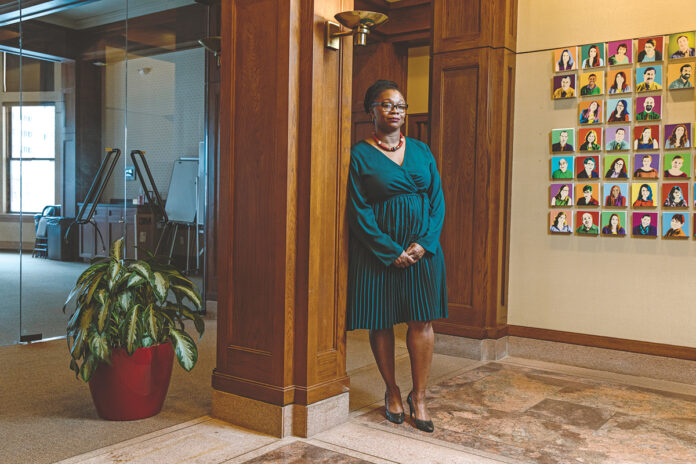Angela Bannerman Ankoma | Vice president, Rhode Island Foundation
1. You’ve been appointed to lead the Equity Leadership Initiative, a component of the Rhode Island Foundation’s three-year, $8.5 million plan to eliminate inequality and racial disparities and promote inclusion and diversity. What is the initiative? The Equity Leadership Initiative is an effort that proposes to support the next generation of leaders in Rhode Island. There are two primary aims: to cultivate the next generation of racially diverse leaders and to facilitate opportunities for these leaders to hold positions of influence throughout the state.
2. What is it about the initiative that drew you to it? One of my favorite quotes by Marian Wright Edelman is, “You can’t be what you can’t see.” Representation matters. Not only because it shapes what we can imagine – and make possible – but also because it makes us stronger. There is a documented lack of representation of leaders of color. For example, a 2019 report by the Association of Fundraising Professionals Rhode Island Chapter noted that while 30% of the state’s population are people of color, only 3% of CEO roles at the largest nonprofits are held by people of color. We need to do better.
3. What will make this different from programs already in place? The Equity Leadership Initiative is intentional about its focus on supporting underrepresented and often underutilized diverse talent, and it prioritizes racial equity. The initiative will also honor the lived experience of these leaders and how their leadership has been impacted by systemic racism.
4. What will it mean for the business community? One of the key aspects of leadership is developing a succession plan. Historically, businesses have failed to ensure that succession plans include Black, Latino, Indigenous and Asian people. The Equity Leadership Initiative hopes to change that course. Business models are changing. Part of adapting business models requires that you have a diverse talent pool. The initiative strives to build that diverse talent pool and to be a strategic thought-partner in making sure that there is diverse representation at key decision-making tables in our state.
5. As the director of this initiative, what are your goals within the first six months? My goals for the first six months are to complete an assessment of existing leadership initiatives and efforts both locally and nationally, establish an advisory committee of partners and stakeholders, and launch the initiative.













